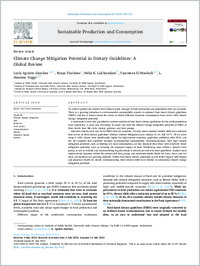Climate change mitigation potential in dietary guidelines : a global review
- Aguirre Sánchez, Lucia Institute of Public Health (IPH), Università della Svizzera italiana, Switzerland - Istituto di comunicazione e politiche pubbliche (ICPP), Facoltà di comunicazione, cultura e società, Università della Svizzera italiana, Svizzera
- Teschner, Ronja Institute for European Global Studies, University of Basel, Riehenstrasse 154, Switzerland
- Lalchandani, Neha K. School of Public Health, University of Adelaide, Level 4 Rundle Mall Plaza, 50 Rundle Mall, Australia
- El Maohub, Yassmeen Institute of Public Health (IPH), Università della Svizzera italiana, Switzerland - Istituto di comunicazione e politiche pubbliche (ICPP), Facoltà di comunicazione, cultura e società, Università della Svizzera italiana, Svizzera
- Suggs, L. Suzanne ORCID Institute of Public Health (IPH), Università della Svizzera italiana, Switzerland - Istituto di comunicazione e politiche pubbliche (ICPP), Facoltà di comunicazione, cultura e società, Università della Svizzera italiana, Svizzera
- 2023
Published in:
- Sustainable Production and Consumption. - 2023, vol. 40, p. 558–570
English
To achieve global and country-level climate goals, changes in food production and population diets are essential. There is a growing attention to environmental sustainability aspects in national Food-based dietary guidelines (FBDG), but less is known about the extent to which different countries communicate food advice with climate change mitigation potential. A systematic review and quantitative content analysis of food-based dietary guidelines for the adult population were conducted. A score was developed to assess and rank the climate change mitigation potential of FBDG at three levels: food life cycle, dietary patterns, and food groups. Selection criteria were met by 93 FBDG from 92 countries. Overall, most countries include little low-emissions food advice in their dietary guidelines (Dietary Climate Mitigation score median 31.14, IQR 19.71–39.14, score range 0–100). Scores were significantly higher for high-income countries, guidelines published after 2010, and the 38 countries that explicitly mention environmental sustainability. Recommendations with high climate mitigation potential, such as limiting red meat consumption, are less frequent than those with relatively lower mitigation potential, such as reducing the transport impact of food. Positioning meat within a broader food group, so not as default, and recommending legume intake is already prevalent in most guidelines. Explicit meat replacements, legumes within the protein-rich food group, and maximum intake limits for dairy, meat, and red meat, are included in a growing minority. Future food-based dietary guidelines can be better aligned with human and planetary health by clearly communicating what dietary shifts have limited or substantial climate change mitigation potential.
- Collections
- Language
-
- English
- Classification
- Medicine
- License
- Open access status
- hybrid
- Identifiers
-
- DOI 10.1016/j.spc.2023.07.015
- ARK ark:/12658/srd1331171
- Persistent URL
- https://n2t.net/ark:/12658/srd1331171
Statistics
Document views: 70
File downloads:
- Aguirre-Sanchez_2023_Elsevier_Sust Prod and consump_Climate change mitigation: 42
